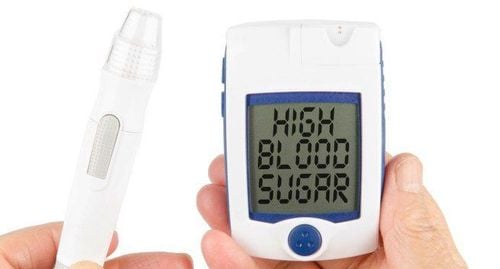This is an automatically translated article.
You can think of hot flashes - sudden hot flashes that emanate from the head, neck or trunk possibly with red, blotchy skin, sweating, and heart palpitations - as something only women get at the time of cessation of menstruation. However, these hot flashes can be the result of many causes as your body tries to cool down. Not everyone sweats when they do, and you may feel chills afterward. Here are some possible causes of your hot flashes.
1. Hormone levels
This is the cause behind hot flashes during menopause. As the estrogen in their bodies declines, a woman's thermostat is reset and the cooling measures begin to take effect sooner. But a man can experience hot flashes when their testosterone levels drop in middle age, especially if they've been treated for prostate cancer. An overactive thyroid gland, which can be caused by Graves' disease or after childbirth, or another cause of high thyroid hormone levels, can also cause this condition.
2. Exercise
Your body temperature naturally rises when you work hard. To keep up, your cells burn more fuel, generating more heat. Your body brings more blood closer to your skin to cool it, and the evaporation of sweat helps lower your temperature. That's why it's so important to stay hydrated while working out. If you exercise regularly, your body will get used to the heat you generate and your core body temperature may rise slightly before you react.
Tập thể dục khiến nhiệt lượng cơ thể bạn tăng lên cao hơn bình thường
3. Fever
Your body burns when fighting germs. And the increased body temperature activates a part of your brain called the hypothalamus to initiate the cooling process and bring your temperature back to normal. Call your doctor if you have a fever of more than 103 or if you also have a severe headache, have trouble breathing, or can't stop vomiting.
4. Allergies
Hot flashes often occur with a serious reaction called anaphylaxis when your immune system releases cells to try to fight something really harmless. You often have other symptoms such as stomach pain, hives, and breathing problems. And you need an epinephrine shot - fast.
5. Nervous disorders
Your autonomic nervous system controls things you don't have to think about, like breathing rate, heart rate, blood pressure, body temperature, and sweating. Anything that interferes with the way it works can cause blushing. That includes Parkinson's disease, epilepsy, MS, and spinal cord injuries and nerve damage.
6. Migraines and Cluster Headaches
These painful and sometimes disabling headaches can also mess with your autonomic nervous system. Your brain doesn't process messages from the nerves in your head and neck about touch, pain, temperature, and vibration correctly. Your "fight or flight" response may kick in, helping blood to pump and widen the airways.7. Drugs
Flushing can be a side effect of many medications. Certain heart and blood pressure medications, including calcium channel blockers and nitroglycerin, and ED prescriptions, such as sildenafil (Viagra), tadalafil (Cialis), and vardenafil (Levitra), help widen your blood vessels. High doses of steroids can affect your hormone balance. Chemotherapy drugs and pain relievers ranging from aspirin to opiates are also culprits.

Một số loại thuốc làm mở rộng mạch máu có thể là nguyên nhân gây bốc hỏa ở phụ nữ
8. Food and additives
The meal is too spicy, there are five of your alarms that can get a hit from the red pepper. They have capsaicin, which confuses your nervous system and reacts as if you were on fire. Sulfites and sodium nitrate (in meats like hot dogs and cold cuts) can cause blushing. Too much monosodium glutamate (MSG), commonly used in Asian cuisines, can cause hot flashes in people prone to the condition. A hot drink can raise your body temperature and start overheating.
9. Due to emotions
Even a small, healthy emotional response can trigger the condition. Your nervous system is activated, your blood vessels widen, and as a result blood rushes to your skin increasing its temperature. It is more common in women, but it also occurs in men. It is possible that blushers are more sensitive to what others think of them. People who blush easily often respond to stress with a rapid pulse, dry mouth, and difficulty thinking clearly.
10. Scarlet fever
This skin condition does not blush, although it may look like it. Flushing is one of the first signs of a flare-up, often accompanied by a burning, stinging, or itching sensation. Your face may also swell, around the sides of your nose above your mouth. You can control rosacea by avoiding triggers and taking good care of your skin, sunscreen, and possibly your doctor's help.
11. Wine
Both alcohol and one of these chemicals when your body breaks it down widens the blood vessels supplying your skin. Fermented beverages like beer and wine may have other chemicals - histamine, sulfites or tyramine - that have a similar effect. If your liver doesn't process alcohol well, or if you drink alcohol while you're taking certain medications, your hot flashes may get worse.

Sử dụng đồ uống có cồn sẽ làm tăng triệu chứng các cơn bốc hỏa của bạn
12. Tumors
These rare, slow-growing cancers can make hormones or mess you up. Tumors are usually found in your stomach and digestive system, your appendix, or your lungs. Red meat, chocolate, alcohol, exercise, or stress can trigger hot flashes. You may also have purple spheroidal veins on your nose and upper lip, diarrhea and cramps, trouble breathing, or a fast heartbeat.
13. Track your symptoms
Can't tell what's causing your hot flashes? Keep a journal with notes about your episodes and what you're doing, eating and feeling, and any medications you've taken. Then look for a pattern. If it's still not clear after a few weeks, see your doctor (and bring a diary) to help you figure it out.
If you have a need for consultation and examination at Vinmec Hospitals under the nationwide health system, please book an appointment on the website for service.
Please dial HOTLINE for more information or register for an appointment HERE. Download MyVinmec app to make appointments faster and to manage your bookings easily.
Reference source: webmd.com












